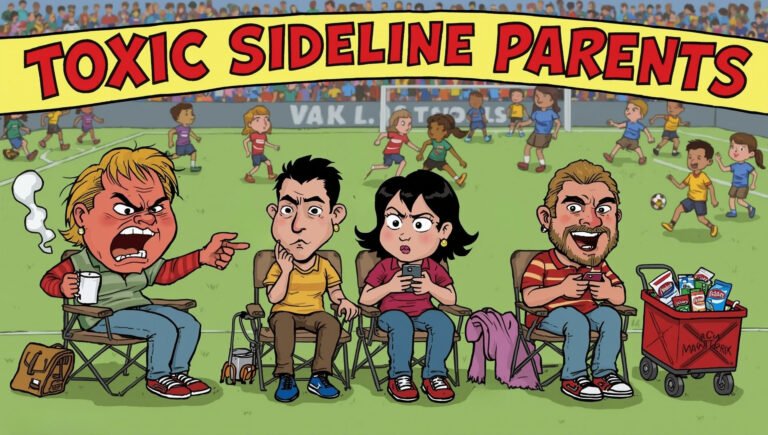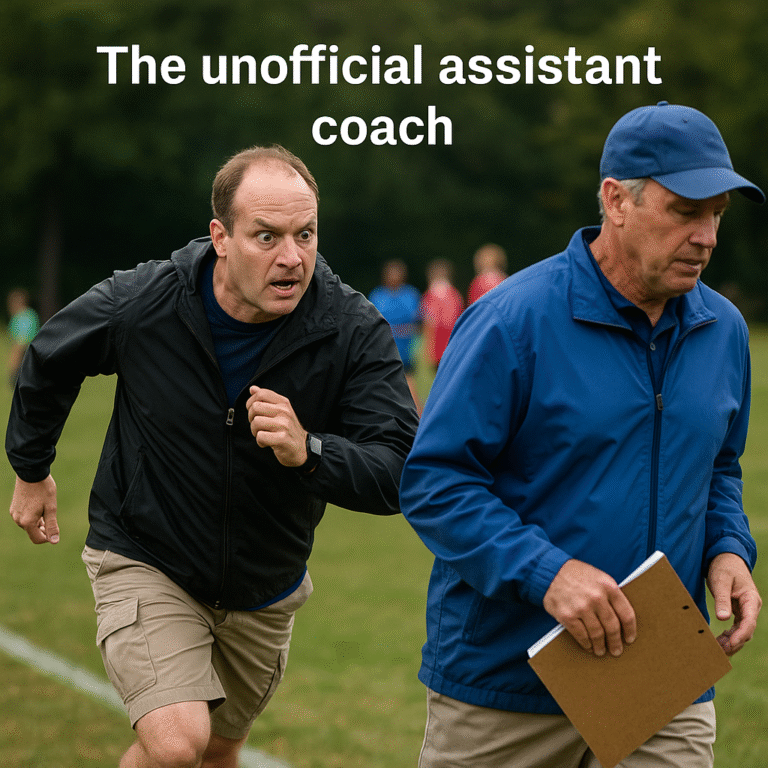Welcome to the Sideline Hunger Games
Youth soccer parents… we need to talk. This week’s rant comes from a U10 soccer coach in Massachusetts, where the sidelines feel less like a Saturday fun run and more like the Hunger Games with juice boxes.
Let me set the scene. It’s Saturday morning. The grass is still wet from last night’s rain. The kids are trickling in, half of them still rubbing the sleep out of their eyes, shin guards strapped to the wrong legs, jerseys untucked, cleats barely tied. A few are practicing cartwheels while the goalie is chasing butterflies near the net. It’s rec soccer. It’s chaos. It’s supposed to be fun.
And then, right on cue, the parents start. One voice cuts through the quiet like a car alarm. It’s not encouragement, not a cheerful “Go team!”, it’s a full-throated roar: “What the hell are you doing?!” And here’s the kicker: they weren’t even yelling at their own kid. They were berating someone else’s nine-year-old. That’s when I had to step in. Politely, calmly, I asked them to knock it off. And you know what I got for trying to keep the field sane? A loud, public “f*** off” directed right at me.
This, friends, is what it’s like dealing with youth soccer parents in Massachusetts.
Youth Soccer Parents Gone Wild

What blows my mind is the disconnect. These kids are nine. They’re here to play, laugh with their friends, get exercise, and maybe figure out where to stand on a corner kick. They’re not trying out for Barcelona. They’re not getting scouted for MLS Next. They’re still at the age where half of them want to play tag more than soccer. And yet, week after week, I see parents on the sidelines acting like they’re managing in the Champions League.
It isn’t just a one-off thing either. Across the country, kids are quitting youth sports in droves, nearly 70% stop by age thirteen and one of the top reasons they cite is pressure from parents. That’s not me talking; that’s from the Aspen Institute’s Project Play . When youth soccer parents make every game feel like a win-or-die audition, kids stop having fun. And if there’s no fun, what’s the point?
If you think I’m exaggerating, go look at our Top 10 Sideline Meltdowns You Secretly Admired. Parents losing their minds isn’t the exception, it’s the expectation.
What Kids Actually Hear

Here’s something youth soccer parents don’t realize: kids aren’t hearing what you think they are. You scream “PASS THE BALL!” and what they hear is “I don’t trust you to figure this out.” You bellow “SHOOT IT!” and they hear “Forget everything coach just taught you at practice.” And when you scream “WHAT ARE YOU DOING?!” you might as well be saying, “Please quit this sport forever.”
The Positive Coaching Alliance has been trying to get this through parents’ heads for years: encouragement works, screaming doesn’t. But week after week, here we are, with grown adults red in the face, veins popping, unloading their stress on nine-year-olds who still giggle when they accidentally kick the ball the wrong way.
If you’ve never noticed this dynamic before, I dare you to watch a game in silence and really focus on what the kids hear. Better yet, read our Sideline Rage Is Destroying Youth Sports. I promise you’ll never shout “BOOT IT!” the same way again.
Why Coaches Are Walking Away

Now here’s where I turn the rant back on myself and every other volunteer coach out there: we’re tired. Do you know how many coaches in Massachusetts quit every year because of parent behavior? Too many. Referees too. And when the refs are gone and the coaches are done, guess what happens? There’s no game.
I love coaching. I love seeing kids light up when they finally figure out how to trap a ball or make a good pass. But when every Saturday morning feels like refereeing a UFC fight on the sidelines, it makes you wonder why you bother. Parents think they’re helping, but what they’re really doing is running good people out of the sport.
That’s why, after this season, I’ve already decided not to coach travel. My own kid will only play where there are rules, real rules about sideline behavior. Because right now, the rec fields feel like the Wild West, and I’m not willing to let my kid, or anyone else’s, get caught in the crossfire of adult meltdowns.
The Worst of the Worst

If you’ve been around long enough, you know the characters by heart. There’s always the “Playtime Accountant,” stopwatch in hand, tallying every minute their child plays. They’ll corner you after the game like a lawyer cross-examining a witness: “My kid played 18 minutes while hers played 22.” Meanwhile, you’re trying to remember who even scored the goals.
Then there’s the “Injury Minimizer,” the one who shouts “Walk it off!” as a kid limps off the field clearly needing ice. Or the “Snack Critic,” who loses their mind because someone dared bring store-brand mandarins instead of organic orange slices. And of course, the “Ref Rage Machine,” the parent who believes every whistle is an act of injustice and treats the 15-year-old ref like they’re officiating the World Cup Final.
I’ve seen them all. You probably have too. And if you haven’t, just wait. The season isn’t over yet.
Survival Gear for Sane Parents

Now, since fixing human behavior seems like a lost cause, let’s talk survival kits. I honestly believe that if some parents had the right tools, half of these sideline meltdowns wouldn’t happen.
Step one: sit down. A good folding sideline chair might be the difference between screaming on your feet and staying planted. Step two: drown out your own rage with noise-canceling earbuds If you can’t hear yourself yelling, you might just stop. Step three: hydrate. A big Hydro Flask will keep you busy enough that you won’t spend all your energy berating refs. Step four: stay warm. Cold parents are cranky parents, so grab a stadium blanket . And finally, the most important: snacks. Bring a portable cooler bag and fill it. Hangry parents are dangerous parents.
Would this kit save youth soccer? Maybe not. But it might save a Saturday morning.
Can This Be Fixed?

The optimist in me wants to say yes. Leagues around here have started experimenting with “Silent Sidelines” weekends, where parents aren’t allowed to yell anything at all. Just clapping. Just encouragement. You know what happens? The kids play better. They relax. They laugh. They start actually listening to their coaches instead of trying to process a dozen conflicting voices.
The realist in me knows it’ll take more than one weekend a season to fix this. It’s going to take leagues enforcing real rules, parents holding each other accountable, and yes, some coaches speaking up even if it gets us told to “f*** off” in public.
If you’re looking for practical solutions, the Changing the Game Project has plenty of resources for parents who want to do better. The US Youth Soccer Parent Guide lays it out pretty clearly too. The information is out there. The question is whether parents will actually listen.
The Final Whistle
So here’s the message, plain and simple: Parents, if you can’t control yourself at a U10 game, maybe the sidelines aren’t for you. Sit in the car. Watch from a distance. Or just stay home. But don’t ruin the game for the kids because that’s exactly what you’re doing.
If you’re one of the good ones, thank you. We see you, we appreciate you, and we wish there were more of you. If you’re one of the others… maybe it’s time to look in the mirror and ask yourself why you’re acting like a Champions League manager at a Saturday morning rec game in Massachusetts.
As always, drop your own stories in the comments. What’s the craziest thing you’ve seen a parent yell at a youth soccer game? We might just feature you in next week’s rant.
FAQ: Youth Soccer Parents Edition
Why are youth soccer parents always yelling from the sidelines?
Most think they’re helping — but yelling usually does the opposite. Kids tune it out, get embarrassed, or lose confidence. Pressure from parents is one of the top reasons kids quit sports.
What should parents actually do during games?
Cheer, clap, smile. That’s it. The coach handles the coaching. If you can’t resist the urge to scream, try the “Silent Sidelines” approach — encouragement only.
Why are coaches walking away from youth soccer?
Because dealing with unruly youth soccer parents can be more stressful than coaching kids. Volunteers and refs are burning out, leaving leagues scrambling.
How can leagues fix bad parent behavior?
Some try fines, warnings, or bans. Others run “Silent Weekend” experiments. Ultimately, it comes down to parents remembering why their kids play in the first place: fun.
What can I do if another parent is out of control?
Report it to the coach or league rep instead of confronting them directly. Most leagues have codes of conduct — and yes, they apply to parents too.



